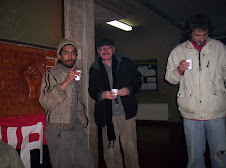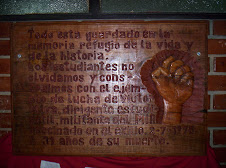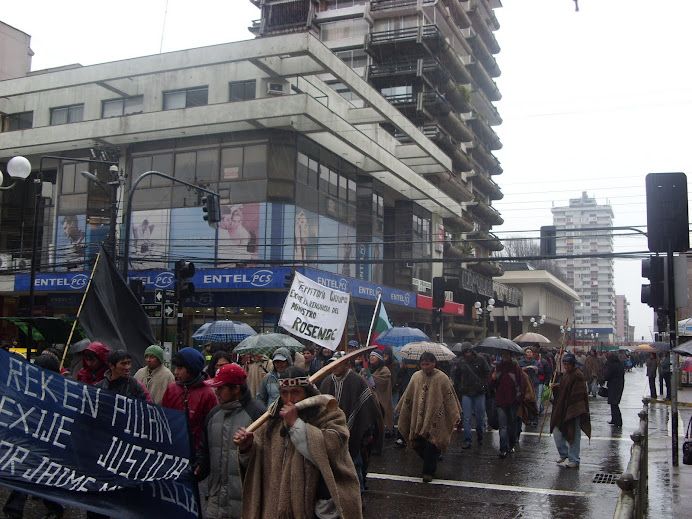Keeping the Balanceby Lisa Gale GarriguesAt the tip of South America, the Mapuche are re-discovering their power to heal themselves and the Earth as they struggle with the effects of oil exploitation, repression, and illness
The Maquehue hospital is an hour-long bus ride from Temuco, Chile, at the end of a dirt road that winds through lush green countryside, passing small farms, slow-moving cows and untethered grazing horses along the way.
There are no imposing multi-storied buildings here, no armies of doctors in important white coats, no polished corridors smelling of disinfectant. Just a couple of simple wooden buildings, one of them with a thatched roof, and next to them a garden of medicinal herbs.
A young Mapuche dances the sacred ostrich in an "earth balancing" ceremony
But in these simple buildings a unique experiment in intercultural medicine is taking place. The hospital integrates the traditional medical knowledge of the indigenous Mapuche people with modern medicine, putting into practice the Mapuche view of health as a holistic balance that includes the individual, the family, the community, and the environment. That balance is threatened. In many areas of Chile and Argentina, the Mapuche are fighting an ongoing battle with multinational corporations for their own health and the health of their environment. In the oil-rich province of Neuquen, in Argentina, where babies and animals have been born with severe birth defects, the Mapuche are suing the Spanish oil company Repsol for damages. Lead has been discovered in the blood of members of other communities in the area, and the traditional healing herbs no longer grow because of disturbance from oil drilling. In another community, local people marched into the offices of a local ski resort, waving branches of trees filled with toilet paper from the resort. And in Chile, just a few miles away from the Maquehue hospital, a 17-year-old demonstrator was killed by police in December during demonstrations against a logging company.
For many Mapuche, the recovery at places like Maquehue of their kimun, or traditional knowledge, and the demonstrations against oil, tourism, mining, and logging companies are part of the same effort, an effort to fulfill their role as “keepers of the earth in balance.”
The Mapuche, who number about 1.5 million, have populated the region of flat desert and pine-covered mountains in southern Chile and Argentina for thousands of years. Settlement by outsiders and multi-national exploitation of their land have left many of them struggling to maintain both their traditions and their health. In the communities around Temuco, they have been suffering from many of the same illnesses that face other Native American people: diabetes, hypertension, tuberculosis. When they showed up to be treated at the local hospital, they encountered racism and neglect.
“Our objective was for our people to recognize their own medicine and leave dependence on mainstream culture behind them,” says hospital director Carlos Zuñiga, as he sits behind a desk in a small upstairs office. Zuñiga is a dark-haired man in his forties who talks in bursts of enthusiasm.
“The attitude at the county hospital was ‘here comes another smoke-smelling Indian,'” said Zuñiga. “It was not a health service, it was a disease-producing service.”
In response, Zuñiga and other community members created the Indigenous Health Association, got a small grant from the Chilean government, and convinced a local Anglican church to lease them their unused hospital. Now their 40-bed facility employs 32 people and sees 60 patients a day. Former ambulance driver Zuñiga was elected by community members to direct the hospital, a role he carries out in the Mapuche tradition of “leading by obeying” the dictates of the community he serves.
For the Mapuche, he explains, a disease is not just something that strikes an isolated individual, but occurs within the context of the family, the community, and the environment. A patient who visits the Maquehue hospital is asked a series of questions about family, neighbors, the year's harvest, and what the patient believes about why he or she is sick. A patient can choose to be seen by one of the two doctors on staff, or be treated by one of the eleven machis, or traditional healers, who work out of their homes in the neighboring area. There's also an Anglican pastor and Catholic priest available.
Family members are often included in the consultation process, and if a patient needs to stay overnight or several days in the hospital, family members are encouraged to stay with them.
Zuñiga draws a line on a piece of paper, with the word “pain” on one end and “disease” on the other.
“Western medicine,” he says, “starts here, with the pain. Mapuche medicine starts with the disease, which is viewed as an imbalance within the person. For us, the disease is caused by a transgression of some kind by the individual, against himself, his family, his community, or his environment.”
“In western medicine, a doctor will give the patient something to treat the pain. In Mapuche medicine, a machi, or traditional healer, treats the disease itself as an entity, and establishes a dialogue with it to find out what the original transgression was and re-establish balance.”
The machi, who is usually, but not always, a woman, might conduct a ceremony, sing or administer medicinal plants. She might enlist other members of the community to participate in a Machitun, a healing ceremony in which young men play the part of warriors, whose role it is to fight off the disease. The machi frequently keeps several patients at a time in her home, which serves as a kind of hospital ward. Other traditional healers, including bone-setters, prayer-singers, and herbalists, might also be involved in the healing.
Seeking the advice of eldersCommunity involvement itself can sometimes be the cure for a disease. When the hospital began, the council of elders was asked to send proposals and advice. One man, who had been chronically ill for some time, immediately began to recuperate as he became involved in putting together the hospital.
Drawing on the council of elders, Zuñiga says, is something that has given him great joy. “In Mapuche tradition, our elders and their wisdom are valued, not thrown away.”
In addition to seeing patients on site, staff at Maquehue also run several rural outposts in outlying areas and see patients in their homes, piling equipment and supplies into a large white van that also serves as an ambulance. Jackie Pinson, a blonde medical student from Australia, was hanging onto her seat in the back of the van on a recent bumpy trip to one of the outposts as she spoke of how much she had learned from her three days of visiting Maquehue.
“It's different from the impersonal attitude I'm used to in Australia,” she says. “They're relaxed, but efficient, giving patients the time they need to tell their stories.”
Pinson is one of several foreign medical students who have visited Maquehue to observe an intercultural health program at work.
At the rural outpost, over 60 people sit inside the tiny wooden building or wait outside to be treated. “With this many people, it's not always possible to be as thorough as we'd like,” says Carlos La Braña, the young doctor on duty. But even with this many patients, La Braña, a non-Mapuche, is able to integrate Mapuche traditions in his brief consultations as he and Mapuche medical technician Gabriela Ellada take blood pressures and temperatures, listen to heartbeats, and hand out antibiotics. One woman who reports having nightmares is asked if she is still sleeping with her Bible next to her bed, a Christianized version of the Mapuche custom of sleeping with a knife next to your bed to protect yourself against bad dreams.
The Maquehue hospital is part of an overall effort by the Mapuche of both Argentina and Chile to include their knowledge of health and the environment in existing health and educational systems. Several Chilean schools are adopting an intercultural model that teaches Mapuche traditions, and in Temuco, Chile, Cecile Nahuelchoe Quidel of the Mapuche Women's Center is organizing a databank of knowledge of Mapuche women healers.
Like other Mapuche, Quidel emphasizes the importance of the environment in overall health. “You can only exist in context with your environment,” says Quidel. “When your environment is healthy, so are you.”
Mapuche spokesperson Veronica Huilipan sees the Mapuche effort to keep the earth in balance as important not just for the Mapuche. “When it rains, it rains for everyone,” she writes in the Mapuche newsletter Werken Kvrvf. “When it snows, it snows for all of us, and when the environment is contaminated, it is contaminated for all of us.”
Like the Mapuche communities throughout Argentina and Chile who are facing the encroachment of multi-national corporations, what the Mapuche people who operate the Maquehue hospital want is the autonomy to control what happens to their community, and to keep their community healthy. The biggest challenge they are currently confronting is their relationship with the directors of the Anglican church, who have told the community they want to take the land back after their five-year lease is up and do away with the hospital. Though some Mapuche feel the land was loaned to the church by the Mapuche in the first place, the community leaders have offered to buy the land from the church, an offer that so far has been rejected.
Despite the uncertainty of the future of their lease, and a frequent lack of material resources, hospital staff and community members have faith that they'll be able to keep the Maquehue hospital going, and that it can become a model for other intercultural programs that nourish and value the rich indigenous traditions of the American continent.
“The Mapuche have a lot to offer the world,” says Mapuche writer and philosopher Lorenzo Loncon, “if only the world would listen.”
Lisa Gale Garrigues is a writer who lives in Argentina. She can be reached at lisagarrigues@yahoo.com.
http://www.yesmagazine.org/article.asp?ID=581
*
*
*































































































.jpg)

.jpg)



























































































No hay comentarios:
Publicar un comentario